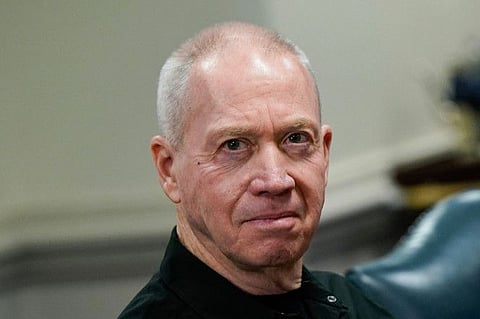Israel’s hawkish Yoav Gallant driving war in Lebanon
Gallant faces accusations of war crimes over Israel’s ongoing military campaign in Gaza

JERUSALEM: Defence Minister Yoav Gallant, a former general who has shaped Israel’s war against Hamas in Gaza, is a prominent force behind the expansion of the nearly year-long military campaign into Lebanon.
The hawkish politician, a member of Prime Minister Benjamin Netanyahu’s party who at times clashed with him over policy issues, has repeatedly stressed that Israel must take the fight to Lebanon, where Iran-backed Hezbollah militants have launched cross-border attacks after Palestinian ally Hamas’s October 7 attack.
The near-daily exchanges of fire since early October 2023 have displaced an estimated 60,000 people on the Israeli side, and officials like Gallant have called to push the Lebanese militant group away from the border to allow their safe return.
Military action was “the only way to ensure the return of communities in northern Israel to their homes”, Gallant told visiting US envoy Amos Hochstein last month.
And on September 18, the Israeli minister declared that “the centre of gravity” of Israel’s military campaign was “shifting north”, calling it “the beginning of a new phase of the war, which requires courage, determination and perseverance”.
This week Israel announced its ground troops had begun raids against Hezbollah inside Lebanon, after a spate of attacks that had decimated the powerful group’s leadership.
“Gallant was one of the first to support the idea that Israel needed to take the initiative in the north, just days after the October 7 attacks,” said Michael Horowitz, a geopolitical expert at the Middle East-based security consultancy Le Beck.
Calev Ben-Dor, a former analyst at Israel’s foreign ministry, said the “reasoning was that in a war, it is preferable to fight the more powerful foe first, and Hezbollah’s strength far outweighed Hamas’s”.
‘Responsible’ image
Now, according to Horowitz, Gallant is seen “rightly or wrongly, as having been prescient, betting on Israel’s ability to regain the initiative”.
A former naval commando, military adviser to late prime minister Ariel Sharon and senior military commander who led Israel’s invasion of the Hamas-ruled Gaza Strip in 2008-2009, Gallant has established himself as a “responsible” politician, said Ben-Dor.
“He is considered to be focused on winning the war and the perceived national interest, rather than playing petty politics,” giving him credit even among Israelis “who do not necessarily share his political views”, added the former analyst.
Gallant, 65, faces accusations of war crimes over Israel’s ongoing military campaign in Gaza, which has killed at least 41,788 people, the majority of them civilians, according to figures provided by the Hamas-run territory’s health ministry. The UN has described the figures as reliable.
Israel had launched its campaign in retaliation for Hamas’s unprecedented October 7 attack, which resulted in the deaths of 1,205 people in Israel, mostly civilians, according to an AFP tally based on Israeli official figures that include hostages killed in captivity.
In May, International Criminal Court prosector Karim Khan laid out charges against Netanyahu and Gallant including war crimes, crimes against humanity and intentionally killing and starving civilians, requesting arrest warrants which have yet to be granted.
‘Nonsense’ war aims
Gallant has frequently disagreed with Netanyahu, including over controversial judicial reforms that sparked a wave of protests since early 2023 and Gaza truce negotiations.
Horowitz said that the defence minister, who has survived at least one attempt to sack him, is seen as a more “unifying” national figure than the abrasive prime minister and his far-right allies.
Gallant, a father of three, joined Netanyahu’s Likud party in 2019, several years after entering politics with centre-right party Kulanu.
Horowitz said that Gallant believes he had been denied a crushing victory against Hamas during the 2008-2009 Gaza war, when he served as the military’s Southern Command chief.
“This has contributed to his image as a strong military leader, who in retrospect was right, especially after the October 7 attacks.”
But during the current war, Gallant was quoted in August by Israeli media as having dismissed Netanyahu’s stated war aim of “total victory” against Hamas in Gaza as “nonsense”.



